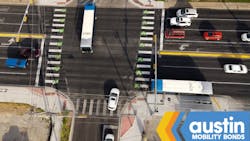Austin City Council awards first 2020 Mobility Bond construction contract
The Austin City Council authorized the first construction contract under the 2020 Mobility Bond passed in November 2020. Proposition B will raise $460 million through bond sales for a series of transportation infrastructure projects such as sidewalk improvements, urban trails, bikeways, transportation safety projects and $19 million in local transit enhancements not covered in the region’s transit mobility program, Project Connect.
On March 22, Austin City Council authorized the award of a one-year $6-million construction contract with Unity Contractor Services, Inc., for the 2020 Bond Local Mobility Project Construction Indefinite Delivery/Indefinite Quality contract. The contract carries four, one-year extension options worth $6 million each and a total contract not to exceed $30 million.
The city council explains the contract authorization marks the beginning of the six-year implementation timeline set for the bond as committed in the contract with the voters.
"We heard in 2016, 2018 and 2020 that delivering safety and mobility improvements for Austin is on the top of voter’s minds,” said Assistant City Manager Gina Fiandaca. “The community has given us the resources and now it’s our job to make sure the improvements happen so all Austinites can get to their destinations safely and sustainably with more mobility options.”
The city explains the new construction contract enables multiple local mobility projects such as pedestrian crossings, transit stops, asphalt speed cushions, pavement markings and signage which will enhance safety, mobility and transit access in neighborhoods throughout Austin. More than 20 new and improved pedestrian crossings will be built in the first phases of the contract including investments that will improve safety such as getting to and from bus service to the Austin Community College Eastview campus and improving access to parkland along Nuckols Crossing Road.
The 2020 Mobility Bond, totaling $460 million, is divided into three discrete programs: Large Capital Improvement Projects, Substandard Streets and Local Mobility. The Local Mobility Program funds the bikeways, sidewalks, safe routes to school, transit enhancement, vision zero, urban trails and neighborhood partnering programs.
About the Author
Mass Transit Staff Report
Stories under this byline were produced through a team effort by the editorial staff of Mass Transit.
To learn more about our team, click here.
If you have a story idea, let us know by emailing [email protected]. Please review our contributor guidelines found here.
